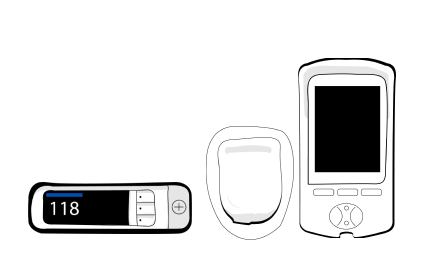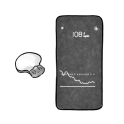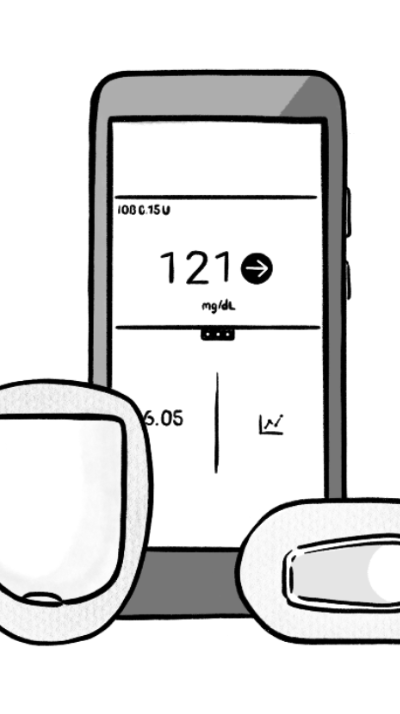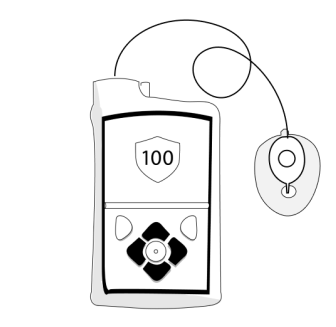Diabetes Device Choices
Overview
Meter & Pump
Meter & Omnipod

Omnipod is the only tubeless pump option. The Omnipod controller is also a glucose meter.
Sensor & Pump
Medtronic Sensor & Medtronic Pump

The Medtronic sensor and pump communicate with each other, so there's no need to keep track of a separate sensor receiver.
Priority: Overall
Next Steps

You're going to do great on the devices you choose
Talk to your provider to get a prescription. Advocate for yourself with a list of reasons why you believe it is best for your lifestyle.
Talk to the device companies about the device you want and if your insurance will cover it. They can help with this.
Many insurance companies require documentation of different qualifications before approving diabetes device coverage. every insurance company is different but some common qualifications include checking your blood sugar 4-6 times per day or having frequent low blood sugars. Understanding what qualifications are necessary for device coverage before starting the approval process can make things a lot easier.
Visit https://diabeteswise.org/resources/getting-treatment/qualify-for-insurance/ for more resources.
Questions for your Doctor
Meter & Omnipod
Can I try this before I commit to it?
A lot of provider offices have sample devices you can touch and feel to get a sense of how they work. Some offices even have a trial device you can use for week to see how it works for you.
Medtronic Sensor & Medtronic Pump
Can I try this before I commit to it?
A lot of provider offices have sample devices you can touch and feel to get a sense of how they work. Some offices even have a trial device you can use for week to see how it works for you.
Questions for your insurance
Many insurance companies require documentation of different qualifications before approving diabetes device coverage. Every insurance company is different, but some common qualifications include checking your blood sugar 4-6 times per day or having frequent low blood sugars. Understanding what qualifications are necessary for device coverage before starting the approval process can make things a lot easier.
Talk to the device companies
Meter
Because there are so many options, and they don't have huge differences - the best thing to do is see what options your insurance companies will cover. The best way to find that out is through your doctor.
WalgreensOmnipod
Call Omnipod and ask them about your coverage. Talk to your Doctor to get a prescription.
1-800-591-3455 Omnipod WebsiteGuardian Connect
Call Medtronic and ask them about how much it will cost with your insurance coverage. Talk to your Doctor to get a prescription.
1-800-646 4633 Medtronic WebsiteMedtronic 630G
Call Medtronic and ask them about your coverage. Talk to your Doctor to get a prescription.
1-888-350-5440 Medtronic WebsiteAdditional Resources
By Priorities
 Active Lifestyle
Active Lifestyle
 Avoiding Highs and Lows
Avoiding Highs and Lows
 Comfort
Comfort
 Easy Insulin Dosing
Easy Insulin Dosing
 Easy to Use
Easy to Use
 Fewer Fingersticks
Fewer Fingersticks
 Privacy
Privacy
Cost & Coverage
Meter

Guardian Connect

Glucose Testing Supplies
Meter & Fingerpricker (1 time purchase)
Strips & Supplies
Sensors
Transmitter
Glucose Testing Cost Estimate
Startup $0 to $60
Monthly $100
There are lots of different meters out there. It's worth seeing which are covered by insurance - they will cover some of the cost of the strips. Often your doctor can give you a meter for free, worth asking.
Startup $69 to $206
Monthly $32 to $97
These prices vary by Insurance. If you call Medtronic they will start a process to check exactly how much your costs will be. Generally Medtronic pumps and sensors are covered by private insurance and medicare. It may be covered under durable medical goods or a pharmacy benefit.
Omnipod

Medtronic 630G

Insulin Dosing Supplies
Pods
Reader
Insulin
Pump
Insulin Cartridges
Infusion Sets
Insulin Dosing Cost Estimate
Startup $5 to $1260 Monthly
Omnipod is now covered by Medicare and Medicaid as well as most private insurers.
Widely covered for insulin-dependent type 1 and type 2. Pump can be provided by pharmacy, DME, or directly through Medtronic Diabetes. Price range; $0-$8,574 to start and $0-$300/Month. Price range varies depending on insurance coverage.



